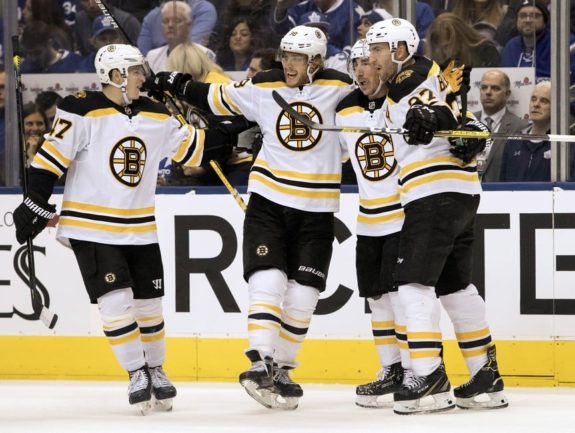There is no doubt that the Boston Bruins have been rolling this year. Heading into their game with the Pittsburgh Penguins last Monday, the Bruins sat at 10-1-2, leading the Atlantic Division. Their first line has been producing points in just about every game and their goaltenders have played at an extremely high level.

Even with this great success, the Bruins reached a rough patch. A tough back-to-back stretch starting with the Penguins and followed by a matchup with the Montreal Canadiens the next day led the Bruins to struggle in multiple areas. However, despite losing their second game to the Canadiens, the Bruins showed their resilience and fight in combatting the struggles of their goaltenders and the clear fatigue they faced. The team competed in both games, beating the Penguins and losing by just one goal to the Canadiens.
Related: Victor Mete Scores Twice, Canadiens Halt Bruins’ Win Streak at 6
Bruins’ Goaltending Struggles
The Bruins are known for having one of the best goaltending tandems in the entire NHL and they have played up to this praise once again this season.
Related: 5 Best NHL Backups
To put this into perspective the tandem had allowed four or more goals just four times this season heading into their matchup with the Penguins. Tuukka Rask’s 1.99 goals-against average (GAA) is tied for second in the NHL and his .933 save percentage (SV%) is tied for third. Both Rask and Jaroslav Halak have been instrumental in the Bruins’ red-hot start to the season and they will need them to continue this throughout the season if they are to do anything significant. Halak currently has a 2.82 GAA and has come up with big wins when Rask was not available.

The Bruins did not see this type of production early in the week, however. Halak allowed four consecutive goals to the Penguins on Monday, surrendering a 3-0 lead and Rask ceded five goals to the Canadiens on Tuesday. Rask even stated that it felt like the puck was a “golf ball, not a hockey puck” on his way to a rough .839 SV% on the evening. Despite these challenges, the Bruins showed their true nature by fighting through and staying in both games, winning one.
In losing a 3-0 lead, the Bruins gave more momentum to the Penguins with each goal. Many teams would not be able to get themselves back into a rhythm, nevermind win the game, but the Bruins were able to put the pressure back on the Penguins’ defensemen in the third period.
Puck possession led to penalties and more time outside of their own zone for the Bruins. With this, the Bruins took the pressure off of the struggling Halak and made the game more about neutral ice play and taking advantage of the few scoring opportunities they had on an off night.
Similarly, the Bruins fought back again following some uncharacteristic goals given up by Rask on Tuesday and took advantage of offensive opportunities when they did not have many on the night. They were able to find motivation and momentum when it seemed that it would be taken away completely on multiple occasions. The Bruins did lose the game late, but their ability to overcome a rough night from Rask and keep it a one-goal game shows that even on their worst nights the Bruins “find a way” — a characteristic often attributed to teams that are successful come the postseason.
Fatigue
The tests the Bruins faced during this stretch of games extended past their goaltending. It was clear that their best game was not available while playing both the Penguins and Canadiens and that fatigue was playing a big factor. Having no travel day in between two tough games was a clear challenge, and one the Bruins faced with determination.

The team did look noticeably slower and sloppier with the puck and it showed in the box score. The Bruins were outshot in both games while posting just 26 and 25 shots on goal, respectively. Careless mistakes in their own zone and mishandling the puck by players such as Brandon Carlo led to grade-A scoring opportunities and a lack of puck possession for significant portions of the game. This made it harder to produce offensive opportunities as the Bruins had just two scoring chances in the third period against the Penguins. They did have seven third period scoring chances against the Canadiens, however, the overall shot production was not enough, in the end, to keep up with Rask’s rough night.
The Bruins’ ability to overcome their mistakes and lack of energy was highlighted by the reduced scoring chances they put together and the goals they scored despite this.
It seemed as though they were able to find bursts of energy when they needed it the most. Even in losing to the Canadiens, the Bruins battled back from multiple deficits. Had it not been for a controversial offside call late, they may have finished the job.
Playing competitive hockey despite obstacles is an attribute that the Bruins had for a few seasons now. As see this past season, playing through multiple key injuries and tough scheduling.
Overall the Bruins showed that even on their worst nights they can hang with and even beat quality NHL teams. Teams have off nights throughout the season and it is on these nights that you can truly see their resilience of which the Bruins showed they have plenty.